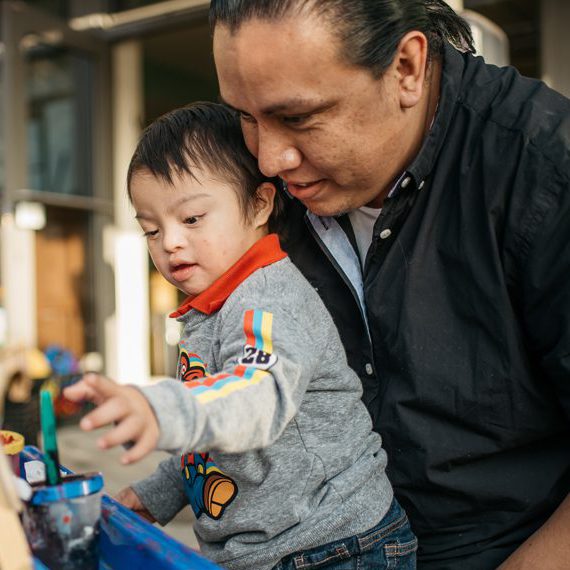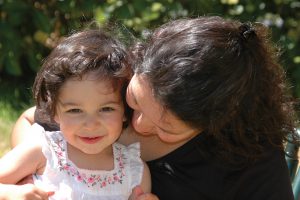The Barnard Center has several ongoing and reoccurring projects that support sustained workforce development. Our aim is to provide the knowledge and skills to service providers in a range of roles and organizations. We provide local and state-wide training nationally and internationally to a varied workforce including nursing, early intervention services (speech, language, occupational therapy, and physical therapy), social work, mental and behavioral health services, and pediatrics. The abbreviations are: Advanced Clinical Training Program (ACT), Promoting First Relationships® Home Visiting (PFR-HV), Promoting First Relationships® in Pediatrics (PFR-PEDS), Parent-Child Interaction Assessment (PCI), Keys to Infant Caregiving (KEYS), and Beginning Rhythms (SLEEP). For more information on current workforce grants and contracts please see below.

The Advanced Clinical Training (ACT) Program is designed for post-graduate (Masters or PsyD) licensed and license-eligible mental health professionals and consists of a foundations phase, an advanced clinical training phase, and two vital supporting activities – infant observation and reflective practice/consultation groups. The Foundations Phase introduces and grounds clinicians in the principles, knowledge, skills, and perspectives of infant and early childhood mental health and child development from prenatal to 5 years of age. The Advanced Clinical Training Phase focuses on specialized clinical infant and early childhood mental health treatment rooted in contemporary understanding and application of attachment and psychodynamic/psychoanalytic theories and concepts. In addition to the traditional focus on relational processes and perspectives and the reflective stance, the ACT Program integrates diversity-informed practice principles based on the Diversity-Informed Tenets for Work with Infants, Children and Families to prepare clinicians to address the influences of systemic and structural inequities on the lives of infants, children and families. This includes the deeply rooted social and cultural influences of normative standards based on race, gender, class, ability, sexuality, age, and other social positioning factors and identities.

Promoting First Relationships (PFR) is an evidence-based curriculum for service providers to help parents and other caregivers meet the social and emotional needs of young children. The program utilizes a strengths based video feedback approach that is grounded in attachment theory and reflective practice principles. PFR gives professionals who work with families with young children (0–5) the knowledge, tools, and consultation strategies to help guide and support caregivers in gaining confidence and knowledge, increase parental sensitivity, and improve child outcomes.
Jen Rees
rees@uw.edu
Carol Good
goodc@uw.edu
PFR has multiple levels of training designed to meet the needs of agency and state or local governments. Our trainers are available to train your workforce on a schedule that works for you. These trainings are available online or in person.
Level 1 Workshop – This engaging and interactive PFR workshop provides staff with foundational knowledge in attachment theory and promoting secure caregiver-child relationships, development of self for infants through preschoolers, understanding and intervening with challenging behaviors, building caregiver reflective capacity, and use of PFR consultation strategies. Participants receive the full curriculum and parent handouts to begin using the program in their work. Workshop can be delivered virtually over 4 half days, or in-person, over 2 days, when it is safe to do so.
Level 2 Certified Training – For agencies and organizations that want to implement an evidence-based home visiting model, PFR level 2 training provides 4 months of professional development in which staff participate in weekly, online mentored sessions with a PFR master trainer on the pathway to become Certified PFR providers. During this process, providers hone their infant mental health observation and reflection skills as they view and discuss professionally filmed PFR intervention sessions with caregivers and young children. They also hone their practice skills as they intervene with a caregiver/child dyad at their own site to deliver the 10-week PFR intervention. Providers are supported in their learning as they reflect on videos of the dyadic interactions and how to implement the PFR concepts and consultation strategies.
Level 3 Agency Trainer Model – Agencies and organizations can choose to adopt a PFR Agency Trainer model as a way to sustain and grow the PFR program at their site. Proficient Certified PFR Providers are invited to become Agency Trainers for their organization. Agency Trainers provide level 2 training to staff within their organization, conduct regular PFR reflective consultation, and provide overall support for the program within their organization.
Department Child, Youth, and Family - Early Support for Infants and Toddlers
King County Best Starts for Kids/Levy funding
Washington State Health Care Authority
Kids First Australia, Victoria, Australia
Cornwall Hospital Child and Youth Mental Health Services, Ontario, Canada

Promoting First Relationships in Pediatrics (PFR-PEDS) helps professionals to better nurture and support the parent-child relationship during their daily patient encounters. The program combines the new science of early brain development with established attachment-based practices to give medical providers and health care professionals the knowledge, skills and confidence to handle a full range of common pediatric concerns, from the routine well care to challenging behaviors. Participants receive curriculum and handouts that accompany well child visits from newborn to age 3, addressing topics such as responsive caregiving, feeding, sleep and behavior.
Jeannie Larsen, MD, a practicing pediatrician with over 30 years of clinical experience
Jennifer Rees
rees@uw.edu
PFR-PEDS offers organizations two pathways for professional development:
PFR-PEDS workshop: The stand-alone 7-hour workshop can be arranged at convenient times for clinic staff, and is generally offered virtually over 2 half days. Staff leave the training with evidence-based skills and the confidence to handle a full range of common pediatric concerns, from the routine well care to challenging behaviors.
PFR-PEDS workshop + Learning Collaborative: Participants complete the foundational PFR-PEDS workshop followed by monthly, online learning groups led by a PFR-PEDS Master Trainer. During this process, clinicians gain confidence in applying the PFR-PEDS skills during their clinic visits, and grow in their observation skills, feedback to caregivers and reflective capacity. These sessions are supported with additional online content.
King County Best Starts for Kids
Seattle Children's Hospital

The Parent-Child Interaction scales are referred to as the ‘gold standard’ to which other tools and measurements are compared. PCI has different levels of training designed to meet the needs of agencies and state or local governments.
Providers: PCI can be used by multiple disciplines to measure parent-child interaction and demonstrate intervention or prevention effectiveness and to guide your intervention and care planning with a family. Nurses, social workers, psychologists, psychiatrists, speech and language therapists, occupational therapists, physical therapists, early intervention providers, pediatric health professionals, home visitors, and allied professionals all use the scales in their practice.
Skills Gained: The Parent-Child Interaction scales give the user a window into the developing parent-child relationship through the lens of a feeding or a teaching interaction. The most common accolade we hear is how learning the scales “changed my view of interaction forever.” The scale evaluates observed caregiver and child behaviors. Learning to hone observation skills is an invaluable skill gained. One unique aspect of the PCI scales versus other measures is that we look at how parents manage periods of distress or upset and the presence of back and forth or “serve and return” between parent and child; this is valuable information for promoting a safe and secure relationship and self-regulatory skills in a child.
Parent-Child Relationship Programs
pcrp@uw.edu
206-543-8528
Denise Findlay
dmf56@uw.edu
Individual Training: Parent-Child Relationship Programs offers a workshop at least twice a year, either via synchronous online learning or in-person in Seattle. Instructors, trained and certified by PCRP, are interspersed around the country and in some international locations. You may join one of the scheduled PCRP workshops, or PCRP can connect you with a local trainer. Contact our office for assistance with individual training.
Group Training: Our trainers are available to train your workforce on a schedule that works for you. These trainings are available online via Zoom or in-person. To become a certified PCI user, participants attend a three-day workshop for one scale or a five-day workshop for both scales (online training is broken up over a longer period to prevent zoom fatigue. See a sample schedule here). The PCI scales are used across disciplines to understand the parent-child relationship and to measure program effectiveness.
Train-the-Trainer Model. PCI also has a Train-the-Trainer model. Suppose your organization is training several people and you intend to continue to build your workforce skills over the coming years. In that case, it may be more cost effective to select one or two providers to serve as trainers within your agency. Having your own PCI Trainer is the most popular model we have with organizations. Please contact the PCRP Office for more information on getting your own trainer to build your workforce skills.
Parents of newborns and young infants are often filled with questions, anxiety, and are searching for knowledge and reassurance. This program gives your staff the knowledge and confidence to answer questions and to support parents as they learn understand their baby’s behavior and how babies communicate their needs and wants.
Skills Gained: The first few months of life with a newborn are challenging for even the most confident parent(s). The skills gained in this training will give you knowledge and strategies to help parents and caregivers learn about regulation, understand their baby’s behavior, and understand the unique needs and characteristics of their own baby.
Providers: Public Health Nurses, Infant Mental Health Specialists, Social Workers, Early Intervention Therapists/Workers, Home Visitors, Pediatric Care Providers, Doulas, Labor and Delivery Nurses, Postpartum/Newborn Care Nurses, Childcare Providers.
Denise Findlay
dmf56@uw.edu
Individual Training: Keys to Infant Caregiving has two options for training your workforce. Our online training is a four-hour asynchronous online program that comes with a study guide. You may enroll multiple members for $99 each. There is a certificate of completion provided for the online training. If you have just a few individuals you would like to learn this program, you may select the individual, asynchronous online training option.
Group Training: If you want to train multiple providers simultaneously as an in-service training and designate one of your own providers as a facilitator, you may purchase a hard copy of the videos and a set of study guides for your group. The benefit of this option is that once you purchase the KEYS videos, you can continue to train incoming staff to fully infuse the knowledge of KEYS into your workforce.
Beginning Rhythms, is our program dedicated to sleep during infancy and early childhood. It contains an information-packed book and three accompanying tools; a record for parents and caregivers to record their baby’s sleep, feeding, and activity, and two parent educational handouts to provide guidance and support during the first year of life. The first handout is specific to the first three months, “the fourth trimester”, and the second is on the rest of the first year and how sleep patterns change after that “fourth trimester.”
Individual Learning: Independent reading and application of the materials is often used by individual practitioners or small organizations. An online, asynchronous learning platform is in development.
Group Learning: This is our most frequently adopted learning strategy. Purchase books and handouts for each staff member and have group sessions to discuss application to practice, skills learned, and offer support for us in practice with a facilitator designated by your agency.
Skills Gained: One of the most frequent concerns of parents is sleep. Is my baby sleeping enough, is my baby sleeping too much, and primarily, “will my baby ever sleep?” This program will give you a deeper understanding of infant sleep patterns and ways to promote regulation and predictable, healthy sleep patterns.
Providers: Public Health Nurses, Infant Mental Health Specialists, Social Workers, Early Intervention Therapists, Home Visitors, Pediatric Care Professionals, Doulas, Postpartum/Newborn Care Nurses, Childcare Providers
Denise Findlay
dmf56@uw.edu
Jonika Hash
jonika@uw.edu

